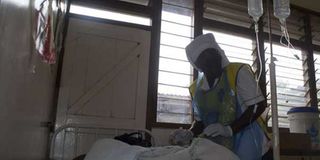Experts warn of likely surge in cholera cases in Kenya

A nurse attends to a cholera patient at Kombewa Hospital in Kisumu last year. The Health ministry has issued a cholera outbreak situation report, in which it has mapped out 12 counties that have reported cases of the diasease. FILE PHOTO | NATION MEDIA GROUP
What you need to know:
- The Health ministry has issued a cholera outbreak situation report, in which it has mapped out 12 counties that have reported cases of the disease.
- They are Wajir, Marsabit, Tharaka-Nithi, Tana River, Meru, Busia, Nandi, Garissa, Nakuru, Siaya, Migori and Nairobi.
- Even without the rains, the disease is already ravaging some parts of the country, with the Nyanza, Rift Valley and northeastern regions the most affected.
As the rainy season approaches, health experts and medical organisations are warning of a cholera outbreak due to lack of clean water and proper sanitation.
They say that unless proper investments are made in educating people on the importance of hygiene and how to handle food and water properly, then the country risks a surge in the number of people suffering from cholera.
The Health ministry has issued a cholera outbreak situation report, in which it has mapped out 12 counties that have reported cases of the disease.
They are Wajir, Marsabit, Tharaka-Nithi, Tana River, Meru, Busia, Nandi, Garissa, Nakuru, Siaya, Migori and Nairobi.
On the other hand, medical charity Médecins Sans Frontières (Doctors Without Borders) or MSF, says that “substandard water and sanitation situation is creating ideal conditions for a future increase in cholera cases.”
Although the country has been dealing with the effects of cholera outbreaks for the last one year, MSF head of mission in Kenya Charles Gaudry says there is a need to set up strong emergency measures to address the now perennial problem.
“We have seen the number of patients decrease since the first outbreak in 2014, but the upcoming rains will likely revive outbreaks,” says Mr Gaudry.
He also adds: “Unless stronger and immediate emergency measures are put in place, there is a very high risk that we will see another increase.”
But even without the rains, the disease is already ravaging some parts of the country, with the Nyanza, Rift Valley and northeastern regions the most affected.
CONTAMINATED WATER
“Most of the cases we are seeing in Nyanza and Rift Valley counties are as a result of people drinking contaminated water. Even the rivers are being contaminated,” explains Denis Mbae, a cholera programme coordinator at MSF.
And the situation is no different as you move up north. Between July 2015 and February this year, about 2,566 patients were admitted to Wajir Hospital, where 39 people have died.
“Many of the water sources are drying up and the lack of sufficient human waste disposal in the area means there is a high potential for further spread of the disease,” added Mr Mbae.
One of the towns in Wajir South constituency has recorded 110 cases of cholera, with seven deaths since the beginning of the month.
“At the moment we have 25 people admitted at the Sarif Dispensary,” said Abdulahi Hassan, who heads the county’s public health and sanitation.
In Marsabit, the county health department advised residents to avoid shaking hands in a bid to contain the spread of the disease, which has killed one person, while 109 others have tested positive.
REFUGEE CAMPS
The disease has not spared the refugee camps either, as it has also hit the Dagahaley camp in the Dadaab’s refugee complex, with 1,566 cases reported among the 330,000 Somali refugees living in “precarious conditions”.
The World Health Organisation reports that cholera is an acute diarrhoeal disease that can kill within hours if left untreated.
Globally, it is estimated that it kills between 28,000 and 142,000 people annually.
While attributing the recurrence of the outbreak to the lack of proper sanitation, Mr Gaudry emphasised the importance of information and proper infrastructure.
“Most of the affected counties lack toilets, clean water and also lack adequate information about hygiene, something that should be addressed,” he said.





